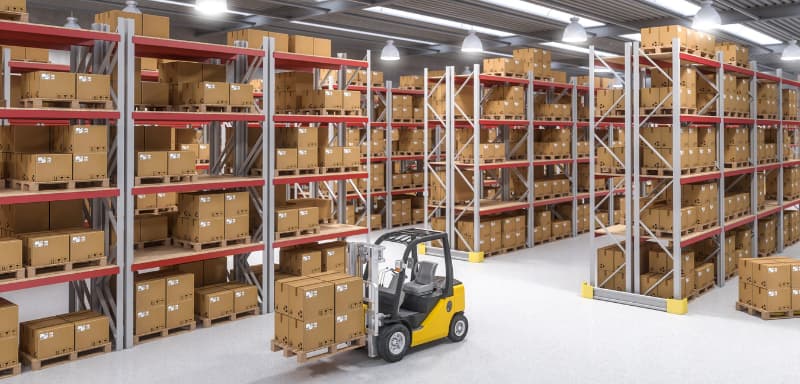Career Paths
Entry Level Warehouse Jobs: Tips and Insights for Success
Find out how to get your foot in the door with entry-level warehouse work. Learn about the roles, skills, and where to apply locally.
Advertisement
From Job Seeker to Warehouse Worker: Your First Step to a Steady Income

If you are looking for a job that doesn’t require a lot of experience but offers steady work, entry-level warehouse jobs are a great option. These roles often include tasks like loading and unloading goods, stocking shelves, and helping with shipping and receiving. You can start these jobs quickly, learn valuable skills, and find opportunities to grow within the company.
Warehouse jobs come in many types, from forklift drivers to warehouse assistants, so there is usually something that fits your interests and abilities. Many of these roles focus on teamwork, attention to detail, and physical work. Understanding what each position involves can help you choose the right job and feel confident in your new role.
What Are Entry Level Warehouse Jobs?
Entry level warehouse jobs offer a way to start working in a warehouse without needing special experience or skills. These roles focus on tasks like handling materials, organizing items, and supporting daily operations.
You will be redirected to another website
You’ll receive messages for less than 1 week, with a maximum of 1 message per day. You can unsubscribe anytime by replying STOP. By submitting this form, I confirm that I am 18+ years old and agree to the Privacy Policy and Terms and Conditions. I also provide my signature, giving express consent to receive informational messages via automated emails, SMS, MMS text messages, and other forms of communication. Message frequency may vary as part of our good-faith effort to respond to your inquiry. Message and data rates may apply. Text STOP to cancel. I understand that my consent to receive communications is not a condition of purchase and that I may revoke my consent at any time.
Common Job Titles and Roles
You will often see job titles like stocking associate, packer, material handler, and warehouse worker. These roles involve moving products, sorting items, and preparing orders.
Other titles include picker, who finds items for orders, and loader/unloader, who moves goods on and off trucks. These jobs usually don’t require advanced skills or training.
Typical Work Environment
You can expect to work in large storage spaces like warehouses or distribution centres. These places often have shelves stacked with products and lots of machinery like forklifts.
The environment might be noisy and fast-paced. You may stand or walk for long periods and sometimes lift boxes or equipment. Some warehouses are climate controlled, but others can be cold or hot depending on the season. In South Africa, large warehouse hubs are found in areas like Ekurhuleni, Durban Harbour, or Cape Town’s industrial zones.
Key Responsibilities
Your main tasks will be handling products safely and efficiently. This includes picking items for orders, packing boxes, labelling shipments, and organizing inventory.
You might also unload trucks and check shipments for damage. Good attention to detail helps you avoid mistakes. Basic teamwork and following safety rules are important to keep the workplace running smoothly.
Essential Skills and Qualifications
To succeed in entry-level warehouse jobs, you need to meet certain physical demands and show key personal qualities. Some basic education and specific certificates may also help you get hired and perform well on the job.
Physical Requirements
Working in a warehouse often means long hours spent standing, walking, and lifting. You typically need good strength and stamina to carry or move heavy items safely. Being physically fit helps reduce the risk of injury and lets you keep up with the fast pace.
Warehouse jobs may also require abilities like bending, reaching, and climbing. Some roles involve operating machines like forklifts, which need good hand-eye coordination. You should be able to work in different environments, such as cold storage or noisy areas, depending on the warehouse.
Soft Skills Employers Want
In warehouses, clear communication is important since you often work with team members and supervisors. You need to listen carefully and follow instructions to avoid mistakes.
Attention to detail helps you keep records accurate and handle inventory correctly. Being organized supports meeting deadlines and managing multiple tasks.
Employers value dependability, meaning you show up on time and work consistently. Problem-solving skills matter when unexpected issues arise, like damaged goods or missing shipments. Being a team player makes daily work smoother and helps you build good relationships.
Education and Certification Needs
Most entry-level warehouse jobs in South Africa require at least a Grade 10 or matric certificate. This shows you have basic skills like reading labels and writing simple reports.
Some warehouses may ask for certifications, especially if you will use equipment like forklifts. The Forklift Operator Certification is common and must be earned through approved training offered by SETA-accredited providers or TVET colleges.
Basic safety training, including how to handle hazardous materials, may also be necessary. You can often find these courses offered by employers or local training centres. Having these qualifications shows you take the job seriously and can follow safety rules.
How to Find and Apply For Entry Level Warehouse Jobs

Finding and applying for entry-level warehouse jobs takes some planning. You need to know where to look for openings, how to create a strong CV, and how to present yourself in an interview. Each step boosts your chances of landing a job.
Where to Search for Openings
Start by checking popular online job boards like PNet, Careers24, or Job Mail. Use filters like “entry-level” and your location to narrow the search. Many companies post warehouse jobs there daily. You can also visit local company websites or go directly to warehouses and ask if they’re hiring.
Sign up for job alerts on these platforms to get new listings sent to your email. Don’t forget to check community job centres, Labour Centres run by the Department of Employment and Labour, or even your local newspaper. Networking with friends or family who work in warehouses can also lead to job opportunities that aren’t advertised online.
Building an Effective CV
Your CV should be clear and easy to read. Start with your contact details and a brief summary of your skills or goals. Focus on simple skills like organisation, the ability to lift boxes, attention to detail, and reliability.
List any past jobs, volunteer work, or school activities that show responsibility or teamwork. If you have no experience, highlight traits like being a quick learner or physically fit. Keep your CV to one page and avoid using fancy fonts or colours.
You can also use free CV tools such as those found on SAYouth.mobi or JobStarter. These tools are helpful if you’re just starting out and need help building your CV from scratch.
Interview Tips for Warehouse Positions
Prepare to answer questions about your ability to work safely and follow instructions. Employers want to know if you can lift heavy items, work in a team, and stay organised. Practice clear and short answers about your past experiences or how you handle challenges.
Dress neatly, even if the job is physical. Arrive early and bring a copy of your CV. Show a positive attitude and ask questions about the job duties or schedule. Being polite and enthusiastic can help you stand out.
Advancement Opportunities in Warehouse Careers
You can grow your warehouse career by learning new skills and taking on more responsibility. Many jobs offer chances to move up through training or by focusing on specific tasks that require special knowledge.
On-the-Job Training and Promotions
You often gain important skills right at work. Many employers provide training to help you use machines, manage inventory, or handle shipping. By showing you can handle these tasks well, you increase your chances for promotion.
Common promotion steps include moving from entry-level roles like order picker to supervisor or team lead positions. You may also become responsible for scheduling or safety checks. These roles usually pay more and involve leadership duties.
To get promoted, focus on learning quickly, being reliable, and helping your team. Taking extra certifications, like forklift operation or inventory management, can also improve your chances.
Specialisations Within Warehousing
Warehouses need workers with specific skills, so you can specialise in areas like equipment operation, inventory control, or quality assurance. Specialising might mean focusing on the technology used to scan and track products or handling complex orders.
Some paths include becoming a forklift operator, a packing expert, or a logistics coordinator. These roles can require extra training but offer more job security and sometimes higher pay.
By choosing a specialisation, you become more valuable to your employer and can open doors to advanced positions in the warehouse or related fields.
Conclusion
Starting a warehouse job at entry level can be the beginning of a solid and rewarding career, especially if you’re ready to work hard and grow your skills.
Whether you’re looking for your first job or a fresh start, warehouse work gives you the chance to earn a steady income, gain experience, and move up over time.
By understanding the roles, improving your CV, and preparing well for interviews, you can take the first confident step toward building a brighter future.
Trending Topics

Common Job Search Mistakes and How to Avoid Them
Avoid common job search mistakes that could cost you your next opportunity. Learn practical tips to make a great impression.
Keep Reading
How to Get an Office Assistant Job – Even with No Experience
Discover the skills, tools, and steps you need to get hired as an office assistant in South Africa—even without formal experience.
Keep Reading
How to Find Jobs Near Me Without a Degree: Jobs You Can Get Right Now
Looking for jobs near you without a degree? Learn how to find entry-level work in South Africa using local job boards, networking, and more.
Keep ReadingYou may also like

How to Start as a General Worker: Essential Tips for Beginners
Start your general worker journey with this easy guide. Find out what skills you need, where to apply, and how to grow in your career.
Keep Reading
How to Follow Up After an Interview for Best Results
Don’t just wait — follow up the right way. This guide shows how to stay polite, show interest, and keep your name on the shortlist.
Keep Reading
Petrol Attendant Job Description: Roles, Responsibilities, and Skills Explained
Learn how to become a petrol attendant in South Africa. No Matric needed—just a positive attitude and this easy step-by-step guide.
Keep Reading